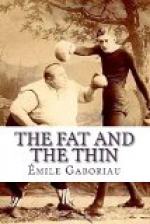[*] 1851. Two days after the Coup d’Etat.—Translator.
In the evening, without knowing how he had got there, still dazed and horrified as he was by the terrible scenes of the afternoon, he had found himself at a wine shop in the Rue Montorgueil, where several men were drinking and talking of throwing up barricades. He went away with them, helped them to tear up a few paving-stones, and seated himself on the barricade, weary with his long wandering through the streets, and reflecting that he would fight when the soldiers came up. However, he had not even a knife with him, and was still bareheaded. Towards eleven o’clock he dozed off, and in his sleep could see the two holes in the dead woman’s white chemisette glaring at him like eyes reddened by tears and blood. When he awoke he found himself in the grasp of four police officers, who were pummelling him with their fists. The men who had built the barricade had fled. The police officers treated him with still greater violence, and indeed almost strangled him when they noticed that his hands were stained with blood. It was the blood of the young woman.
Florent raised his eyes to the luminous dial of Saint Eustache with his mind so full of these recollections that he did not notice the position of the pointers. It was, however, nearly four o’clock. The markets were as yet wrapped in sleep. Madame Francois was still talking to old Madame Chantemesse, both standing and arguing about the price of turnips, and Florent now called to mind how narrowly he had escaped being shot over yonder by the wall of Saint Eustache. A detachment of gendarmes had just blown out the brains of five unhappy fellows caught at a barricade in the Rue Greneta. The five corpses were lying on the footway, at a spot where he thought he could now distinguish a heap of rosy radishes. He himself had escaped being shot merely because the policemen only carried swords. They took him to a neighbouring police station and gave the officer in charge a scrap of paper, on which were these words written in pencil: “Taken with blood-stained hands. Very dangerous.” Then he had been dragged from station to station till the morning came. The scrap of paper accompanied him wherever he went. He was manacled and guarded as though he were a raving madman. At the station in the Rue de la Lingerie some tipsy soldiers wanted to shoot him; and they had already lighted a lantern with that object when the order arrived for the prisoners to be taken to the depot of the Prefecture of Police. Two days afterwards he found himself in a casemate of the fort of Bicetre. Ever since then he had been suffering from hunger. He had felt hungry in the casemate, and the pangs of hunger had never since left him. A hundred men were pent in the depths of that cellar-like dungeon, where, scarce able to breathe, they devoured the few mouthfuls of bread that were thrown to them, like so many captive wild beasts.




